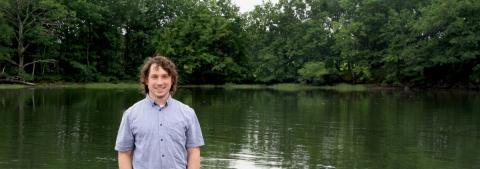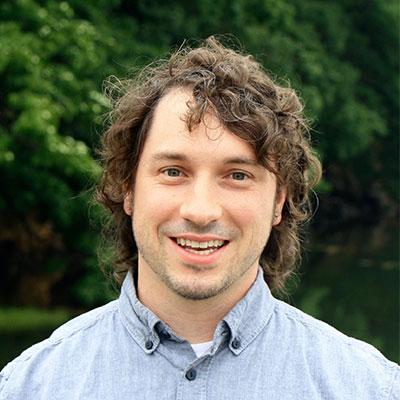Knauss Fellow Nick Anderson splashes into sea-run fish work

New Hampshire Sea Grant is pleased to announce that Nick Anderson, who received his master’s degree this fall from the University of New Hampshire’s Department of Natural Resources and the Environment, was selected as part of the 2021 class of the National Sea Grant College Program’s prestigious John A. Knauss Marine Policy Fellowship.
The Knauss Fellowship, now in its 41st year, honors John A. Knauss, a founder of the National Sea Grant College Program, who formerly served as a NOAA administrator and dean of the University of Rhode Island’s Graduate School of Oceanography. Since 1979, over 1,400 early-career professionals have participated in this year-long paid fellowship that matches highly qualified graduate students with host offices in the legislative and executive branches of the U.S. government in Washington, D.C. Fellows work on national policy issues affecting ocean, coastal, and Great Lakes resources.

Nick just began a year-long fellowship placement in February with the National Oceanographic and Atmospheric Administration’s (NOAA) Office of Habitat Conservation, where he’ll be the National Fish Passage Coordination Specialist. Working with fish will be a change from his master’s research at UNH with Dr. Catherine Ashcraft, where he worked alongside Canadian First Nations’ communities and researchers to develop novel video-monitoring technique for eelgrass. But the shift from eelgrass to fish excites Nick, who has always wanted to work with fish, “I love eelgrass and I really loved working in the estuary, but when I first looked into master's programs, I was looking into work regarding native fish or fishes and restoration.”
For fish passage, NOAA's Office of Habitat Conservation is concerned with improving or increasing access for fish in rivers where there may be blockages like dams preventing historic spawning runs or migrations from the sea. Nick’s prior work with eelgrass took place in estuaries – where freshwater outlets mix with salty ocean waters – and these estuaries are inextricably linked to upstream issues like dams and fish passage. One of his past research projects showed potential impacts to eelgrass from upstream dams, the same type of dam that can limit upstream travel for spawning fish.
“We think of coasts and estuaries as one thing, and we think of rivers and inland as another thing,” Nick explained, “but what we do upstream is really going to have a big impact downstream.”
NOAA has tasked Nick with helping fish passage efforts across the country collaborate, connect, and learn from each other. He’ll be working to improve outreach, “contributing to a conversation about what's going well, where fish passage projects are succeeding, and places where changes could occur in the future, to try and talk more about where fish passage is going, and what's been working so far.”
"I want to be a sponge for how policy affects fish passage, and how it's being used to bring back these historic sea-run species."
- NICK ANDERSON, 2021 KNAUSS FELLOW
Fish passage is a national issue; resource managers for many rivers, streams, and watersheds are making decisions about how to best manage their sea-run species, and Nick will get to participate in policy decisions for the projects NOAA handles. “I am new to the policy side of things,” Nick said, “so I want to be a sponge for how policy affects fish passage, and how it's being used to bring back these historic sea-run species.”
Nick will be able to dive into dam removal and fish passage projects all around the country, which he sees as an opportunity to expand his scientific horizons beyond the Northeast, where he’s spent most of his research career. “I have a pretty good sense of the issues here [in the Northeast], but learning about what's going on in the Southeast or the Gulf, or on the West Coast, that's really new to me. I can name a few fish in each area, but it's going to be something else to hear about fish passage in the Tennessee Valley area, which I know nothing about.”
For now, Nick will be working remotely, like the rest of the staff at NOAA, but he hopes to be able to travel to Washington, D.C. later in his fellowship to work in-person with his team. “I am equal parts excited and terrified. It's going to be something completely new.”